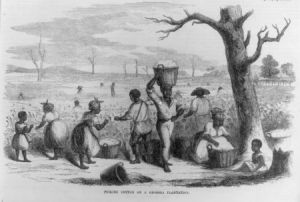 A pseudonymous Baptist from Jefferson, Georgia this week poses (among other queries) the question of why some Baptist churches of the Confederacy are not allowing African slave members to sing in church services.
A pseudonymous Baptist from Jefferson, Georgia this week poses (among other queries) the question of why some Baptist churches of the Confederacy are not allowing African slave members to sing in church services.
I see a practice beginning to take root and develope itself in some of our country churches, against which I enter my protest in the very outset, because I do not believe that it is calculated to redound to God’s glory or the advancement of his kingdom. Innovations in Church or State should be rightly examined before too firmly established; and if likely to be productive of not good upon the whole, should be nipped in the bud. But to the question: Is it right for ministers who lead in our religious services, to give out the first two lines of a song and then take their seat, leaving the hymn in the hands of the choir, or a little squad of singers around the pulpit, or in the centre of the church?
The command is, “Be filled with the Spirit; speaking to yourselves in psalms and hymns and spiritual songs, singing and making melody in your heart unto the Lord.”–But how can this be done, where books are scarce and the congregation large, and no one gives out? What moral or Scriptural right has any divine to pursue a course that contravenes the Lord’s command, or shuts off from his hearers that soul-stirring spiritual influence which singing is well calculated to produce? O! for a return of the good old custom of yore, when the voices of a united congregation, were wont to swell up in one grand chorus through the gallery and garret to heaven’s throne and bring down its richest blessings!
But one more blow and I have done. Our country congregations are largely comprised of blacks, that have no special preaching, no books nor education; but these sable sons and daughters of Africa have a voice almost equal to the Linnet or Nightingale, and what is more, they have souls, and that’s not all–these souls are of just as much importance in the estimation of Deity as those of the whites. We have thought it best to raise a barrier between them and education, over which they cannot pass; but in the name of common sense and religion, what good excuses have we for debarring them from singing to the praise, glory and honor of their great Master, when they leave the toil of the week and assemble on the Sabbath day to worship God? Now, I claim in the abstract, to be no laudator temporis acti [one who praises past times], but under the modern modus operandi of conducting religious services, there the poor blacks must sit as mute as marble statues, and leave the house of God perhaps as cold as icicles, whereas, under the old plan, their voices, in one harmonious whole, would fill the church with music divine, charming the ear and enrapturing the soul, and many would return home shouting the praises of God, with a live coal from the altar burning upon their hearts. Under this late innovation, how can the christian blacks obey divine injunction, “Teaching and admonishing one another in psalms and hymns and spiritual songs, singing with grace in your hearts to the Lord.” Now it is well known that singing exerts a powerful influence for good, especially upon the blacks; and about the only chance they have to learn to sing or memorize hymns to be used in their own religious meetings or around their family altars, or on more private occasions, is at the religious meetings of the whites, when the congregation is allowed to have in full, both the music and the burning words of the sacred poet. Away with the present plan of hearing nothing but the music, and confining that to a little select squad!
The writer assumes that enslaved blacks receive most of their spiritual nourishment in the churches they are forced to attend, listening to white preachers (who frequently remind slaves of God’s will for their inferior status). In reality, the strength that has long allowed African slaves to live in the midst of bondage, beatings and forced family breakups is rooted in their own community, quietly lived away from earshot of slaveholders and often reinforced by a Christian and biblical faith, frequently expressed in song, that whites dare not speak of–liberation and freedom for all God’s children. And now, African slave spirituality is on the ascendancy, hoping and praying that the Emancipation Proclamation of U.S. Abraham Lincoln–a man many slaves view as a new Moses–signals their impending release from the captivity of bondage.
Source: Sentinel, “Is it Right?”, Christian Index, July 24, 1863


